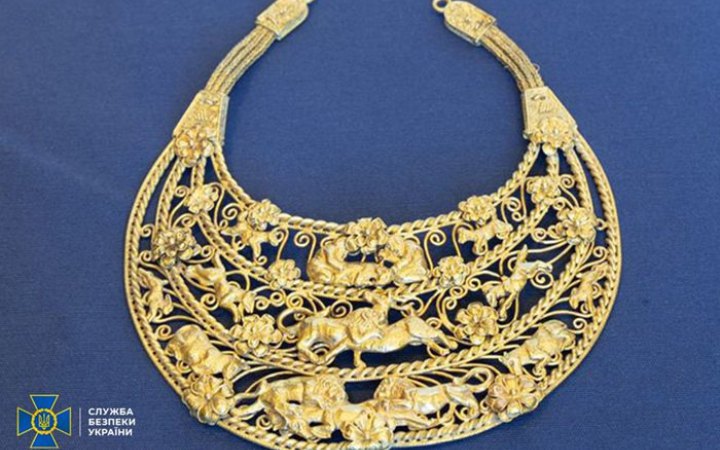A museum in the Netherlands has cancelled its debts for the storage of Scythian gold, the Ministry of Culture and Information Policy (MCIP) reports.
The Ministry and the Allard Pearson Museum - Archaeological Museum of the University of Amsterdam agreed to return museum objects from the state part of the Museum Fund of Ukraine from four Crimean museum institutions. Since 2014, they have been exhibited at the exhibition Crimea - a Golden Island in the Black Sea in the Netherlands.
The document was signed by the acting Minister of Culture of Ukraine Rostyslav Karandeyev and the acting director of the University Library of the University of Amsterdam, Dr Fred Armen.
The museum objects include collections from the Crimean Republican institutions Central Museum of Tavriya, Kerch Historical and Cultural Reserve, Bakhchisaray Historical and Cultural Reserve, and the National Reserve Chersonesos Tavriya.
"The return of artefacts of special historical and cultural significance is a significant and multifaceted process. It combines legal, museum, diplomatic and logistical aspects. We are looking forward to returning the collections, one of which is known as Scythian gold, to Ukraine," Karandeyev said.
He expressed his gratitude to the museum for storing the collections for 9 years, as well as for the decision of the Dutch side not to charge for the storage of the exhibits.
The Ministry of Culture is planning to organise an exhibition of the artefacts after the Scythian Gold is returned to Ukraine.
Earlier it was reported that Ukraine would have to pay almost €100,000 for the storage of the artefacts.
The Scythian Gold Case is one of the first international court cases related to Russia's aggression since the beginning of its occupation of Crimea in 2014. The dispute, which lasted nine years, revealed an important motive of Russia in this war - the war against Ukrainian culture and national memory.
In 2013, the Bonn State Museum LVR-Landes opened the exhibition Crimea. The Golden Island in the Black Sea. The Ukrainian Institute of Archaeology of the National Academy of Sciences of Ukraine created it in cooperation with the Institute of Ancient History of the University of Bonn. Four Crimean museums and the National Museum of History of Ukraine in Kyiv provided their collections for the exhibition.
In January 2014, the golden fund of Ukrainian archaeology was packed up and transported from Bonn to Amsterdam, to the private Allard Pearson Museum. So after the exhibition ended, the Amsterdam museum faced the question of whether to send the exhibits to Kyiv or return them to the Crimean museums.
On 9 June, after almost 10 years of litigation, the Supreme Court of the Netherlands issued a final verdict: it ordered the Allard Pearson Museum to transfer the museum exhibits from the exhibition Crimea - a Golden Island in the Black Sea to the National Museum of History of Ukraine.
The court completely rejected the demands of the occupied Crimean museums, which had tried to appeal the previous decision of the Court of Appeal, also in favour of Ukraine. So now the Scythian gold can return to Ukraine.








